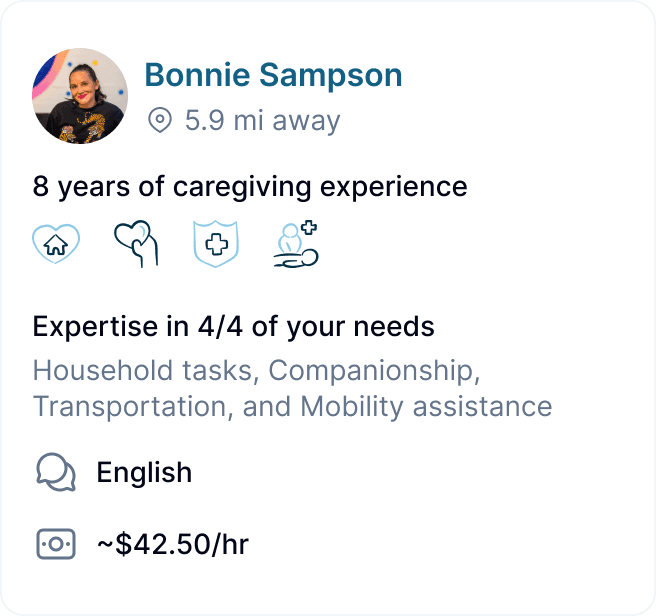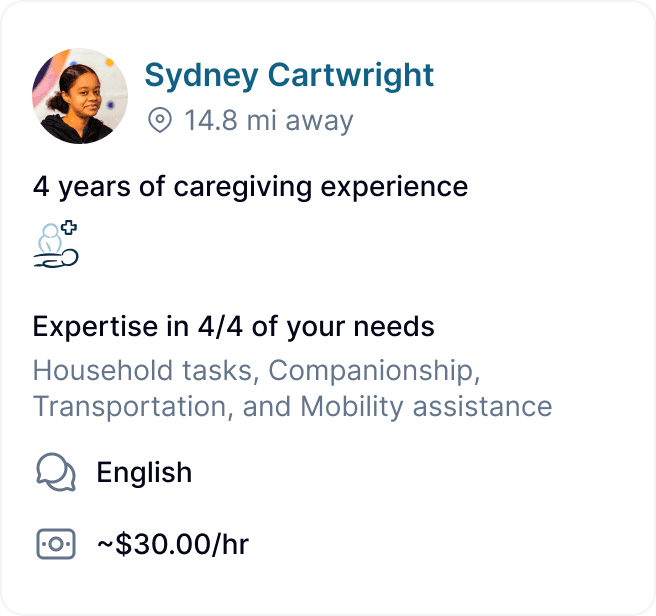Hiring for Flexibility: Matching a Care Schedule to Your Loved One’s Life



When it comes to supporting an aging parent or a loved one with special needs, one of the most important decisions families face is how to arrange in-home care that fits seamlessly into their daily lives. The days of rigid, one-size-fits-all care schedules are fading.
Today, families increasingly seek flexible home care solutions that respect routines, maximize independence, and adapt as needs change. This approach not only enhances quality of life but also empowers families to remain closely involved in their loved one’s care.
Why Flexibility Matters in Home Care
Every individual has unique preferences, habits, and rhythms. For seniors and those needing assistance, maintaining familiar routines—whether it’s a favorite morning walk, a weekly book club, or a cherished afternoon nap—can be vital to emotional and physical well-being.
Flexible home care scheduling recognizes these needs, allowing caregivers to provide support when it matters most, rather than forcing care into a rigid timetable.
Key Benefits of Flexible Scheduling
Enhanced Well-being: Allowing care to revolve around a loved one’s established routines fosters comfort and reduces stress, supporting better mental and physical health.
Family Involvement: Flexibility enables family members to participate in caregiving without being overwhelmed, making it easier to share responsibilities or take necessary breaks.
Cost Effectiveness: By tailoring care hours to actual needs, families can avoid paying for unnecessary services, ensuring resources are used wisely. (See more on the costs of paying for in-home care here, and how Clara can save you money on care here)
Adaptability: As needs change—whether temporarily due to illness or permanently as conditions progress—flexible scheduling allows for quick adjustments without major disruptions.
Assessing Your Loved One’s Needs
Before hiring a caregiver, it’s essential to evaluate your loved one’s daily life and determine when and how much assistance is truly needed. Consider:
Level of Independence: Is help needed only with specific tasks, or is ongoing supervision required?
Daily Routines: What times of day are most challenging? When does your loved one need the most support?
Family Availability: Are there family members who can provide care at certain times, or is professional help needed throughout the day?
Common Scenarios and Scheduling Solutions
Scenario | Recommended Hours | Ideal Scheduling Times |
Minimal Assistance | 2-4 hours/day, 2-3 days/week | Mornings or afternoons for tasks like meal prep or light cleaning |
Moderate Assistance | 4-6 hours/day, 5 days/week | Mornings for personal care, meal prep |
Full-Time Assistance | 8-12 hours/day or 24/7 care | All waking hours or overnight for safety |
Family Caregiver Support (Respite) | 4-8 hours/week | Flexible, based on family needs |
These guidelines are starting points; every situation is unique. Consulting with a care expert can help you develop a customized plan that evolves with your loved one’s needs.
Overcoming Common Challenges
Resistance to Care: Many seniors are hesitant to accept outside help. Starting with a few hours a week focused on specific tasks can ease the transition, building trust and comfort over time.
Balancing Family Resources: If family members are available for some tasks but not others-such as medication management or heavy lifting—supplemental professional care can fill gaps without taking over entirely.
Adjusting as Needs Change: Illness, injury, or cognitive decline can require rapid changes in care. Flexible providers can quickly scale up or down, ensuring continuity and safety. Indeed, a little care is a great place to start! See here for why you should hire a caregiver before you "really need it".
How Clara Home Care Supports Flexible Scheduling
Clara Home Care is at the forefront of this new, flexible approach to in-home care. Unlike many traditional agencies that require minimum commitments (sometimes up to 20 hours per week), Clara allows families to schedule care based on their unique needs, with no inflexible minimums. This means you only pay for the hours you use, and you can adjust the schedule as your situation evolves.
What Sets Clara Apart?
Personalized Matching: Clara uses a combination of advanced algorithms and expert input to match families with caregivers who fit their loved one’s specific needs and personality.
Affordable Rates: Clara helps families save up to 40% compared to traditional agencies, with rates ranging from $30-35/hr.
Rapid Response: In urgent situations, Clara can place a caregiver in as little as 48 hours, providing peace of mind when time is of the essence.
Full Support: Clara handles all payroll, taxes, and insurance, ensuring families are protected and caregivers are fully vetted and background-checked.
Dedicated Customer Service: Support is available seven days a week, making it easy to adjust schedules or address concerns as they arise.
Legal Compliance: Caregivers are classified as W-2 employees, and Clara manages all regulatory requirements, removing administrative headaches for families.
Making the Right Choice for Your Family
Ultimately, the goal of flexible home care scheduling is to support your loved one’s independence, dignity, and happiness—while also giving families the support they need to thrive. By carefully assessing your loved one’s needs, involving them in care planning, and choosing a provider like Clara Home Care that prioritizes flexibility, you can create a care schedule that truly fits your family’s life.
Whether you need a few hours of help each week or full-time support, flexible scheduling ensures that care is always on your terms-respecting routines, maximizing comfort, and adapting as life changes. With the right partner, you can provide your loved one with the personalized, compassionate care they deserve, every step of the way.
Thinking about home care? Get in touch with Clara today.
When it comes to supporting an aging parent or a loved one with special needs, one of the most important decisions families face is how to arrange in-home care that fits seamlessly into their daily lives. The days of rigid, one-size-fits-all care schedules are fading.
Today, families increasingly seek flexible home care solutions that respect routines, maximize independence, and adapt as needs change. This approach not only enhances quality of life but also empowers families to remain closely involved in their loved one’s care.
Why Flexibility Matters in Home Care
Every individual has unique preferences, habits, and rhythms. For seniors and those needing assistance, maintaining familiar routines—whether it’s a favorite morning walk, a weekly book club, or a cherished afternoon nap—can be vital to emotional and physical well-being.
Flexible home care scheduling recognizes these needs, allowing caregivers to provide support when it matters most, rather than forcing care into a rigid timetable.
Key Benefits of Flexible Scheduling
Enhanced Well-being: Allowing care to revolve around a loved one’s established routines fosters comfort and reduces stress, supporting better mental and physical health.
Family Involvement: Flexibility enables family members to participate in caregiving without being overwhelmed, making it easier to share responsibilities or take necessary breaks.
Cost Effectiveness: By tailoring care hours to actual needs, families can avoid paying for unnecessary services, ensuring resources are used wisely. (See more on the costs of paying for in-home care here, and how Clara can save you money on care here)
Adaptability: As needs change—whether temporarily due to illness or permanently as conditions progress—flexible scheduling allows for quick adjustments without major disruptions.
Assessing Your Loved One’s Needs
Before hiring a caregiver, it’s essential to evaluate your loved one’s daily life and determine when and how much assistance is truly needed. Consider:
Level of Independence: Is help needed only with specific tasks, or is ongoing supervision required?
Daily Routines: What times of day are most challenging? When does your loved one need the most support?
Family Availability: Are there family members who can provide care at certain times, or is professional help needed throughout the day?
Common Scenarios and Scheduling Solutions
Scenario | Recommended Hours | Ideal Scheduling Times |
Minimal Assistance | 2-4 hours/day, 2-3 days/week | Mornings or afternoons for tasks like meal prep or light cleaning |
Moderate Assistance | 4-6 hours/day, 5 days/week | Mornings for personal care, meal prep |
Full-Time Assistance | 8-12 hours/day or 24/7 care | All waking hours or overnight for safety |
Family Caregiver Support (Respite) | 4-8 hours/week | Flexible, based on family needs |
These guidelines are starting points; every situation is unique. Consulting with a care expert can help you develop a customized plan that evolves with your loved one’s needs.
Overcoming Common Challenges
Resistance to Care: Many seniors are hesitant to accept outside help. Starting with a few hours a week focused on specific tasks can ease the transition, building trust and comfort over time.
Balancing Family Resources: If family members are available for some tasks but not others-such as medication management or heavy lifting—supplemental professional care can fill gaps without taking over entirely.
Adjusting as Needs Change: Illness, injury, or cognitive decline can require rapid changes in care. Flexible providers can quickly scale up or down, ensuring continuity and safety. Indeed, a little care is a great place to start! See here for why you should hire a caregiver before you "really need it".
How Clara Home Care Supports Flexible Scheduling
Clara Home Care is at the forefront of this new, flexible approach to in-home care. Unlike many traditional agencies that require minimum commitments (sometimes up to 20 hours per week), Clara allows families to schedule care based on their unique needs, with no inflexible minimums. This means you only pay for the hours you use, and you can adjust the schedule as your situation evolves.
What Sets Clara Apart?
Personalized Matching: Clara uses a combination of advanced algorithms and expert input to match families with caregivers who fit their loved one’s specific needs and personality.
Affordable Rates: Clara helps families save up to 40% compared to traditional agencies, with rates ranging from $30-35/hr.
Rapid Response: In urgent situations, Clara can place a caregiver in as little as 48 hours, providing peace of mind when time is of the essence.
Full Support: Clara handles all payroll, taxes, and insurance, ensuring families are protected and caregivers are fully vetted and background-checked.
Dedicated Customer Service: Support is available seven days a week, making it easy to adjust schedules or address concerns as they arise.
Legal Compliance: Caregivers are classified as W-2 employees, and Clara manages all regulatory requirements, removing administrative headaches for families.
Making the Right Choice for Your Family
Ultimately, the goal of flexible home care scheduling is to support your loved one’s independence, dignity, and happiness—while also giving families the support they need to thrive. By carefully assessing your loved one’s needs, involving them in care planning, and choosing a provider like Clara Home Care that prioritizes flexibility, you can create a care schedule that truly fits your family’s life.
Whether you need a few hours of help each week or full-time support, flexible scheduling ensures that care is always on your terms-respecting routines, maximizing comfort, and adapting as life changes. With the right partner, you can provide your loved one with the personalized, compassionate care they deserve, every step of the way.
Thinking about home care? Get in touch with Clara today.
When it comes to supporting an aging parent or a loved one with special needs, one of the most important decisions families face is how to arrange in-home care that fits seamlessly into their daily lives. The days of rigid, one-size-fits-all care schedules are fading.
Today, families increasingly seek flexible home care solutions that respect routines, maximize independence, and adapt as needs change. This approach not only enhances quality of life but also empowers families to remain closely involved in their loved one’s care.
Why Flexibility Matters in Home Care
Every individual has unique preferences, habits, and rhythms. For seniors and those needing assistance, maintaining familiar routines—whether it’s a favorite morning walk, a weekly book club, or a cherished afternoon nap—can be vital to emotional and physical well-being.
Flexible home care scheduling recognizes these needs, allowing caregivers to provide support when it matters most, rather than forcing care into a rigid timetable.
Key Benefits of Flexible Scheduling
Enhanced Well-being: Allowing care to revolve around a loved one’s established routines fosters comfort and reduces stress, supporting better mental and physical health.
Family Involvement: Flexibility enables family members to participate in caregiving without being overwhelmed, making it easier to share responsibilities or take necessary breaks.
Cost Effectiveness: By tailoring care hours to actual needs, families can avoid paying for unnecessary services, ensuring resources are used wisely. (See more on the costs of paying for in-home care here, and how Clara can save you money on care here)
Adaptability: As needs change—whether temporarily due to illness or permanently as conditions progress—flexible scheduling allows for quick adjustments without major disruptions.
Assessing Your Loved One’s Needs
Before hiring a caregiver, it’s essential to evaluate your loved one’s daily life and determine when and how much assistance is truly needed. Consider:
Level of Independence: Is help needed only with specific tasks, or is ongoing supervision required?
Daily Routines: What times of day are most challenging? When does your loved one need the most support?
Family Availability: Are there family members who can provide care at certain times, or is professional help needed throughout the day?
Common Scenarios and Scheduling Solutions
Scenario | Recommended Hours | Ideal Scheduling Times |
Minimal Assistance | 2-4 hours/day, 2-3 days/week | Mornings or afternoons for tasks like meal prep or light cleaning |
Moderate Assistance | 4-6 hours/day, 5 days/week | Mornings for personal care, meal prep |
Full-Time Assistance | 8-12 hours/day or 24/7 care | All waking hours or overnight for safety |
Family Caregiver Support (Respite) | 4-8 hours/week | Flexible, based on family needs |
These guidelines are starting points; every situation is unique. Consulting with a care expert can help you develop a customized plan that evolves with your loved one’s needs.
Overcoming Common Challenges
Resistance to Care: Many seniors are hesitant to accept outside help. Starting with a few hours a week focused on specific tasks can ease the transition, building trust and comfort over time.
Balancing Family Resources: If family members are available for some tasks but not others-such as medication management or heavy lifting—supplemental professional care can fill gaps without taking over entirely.
Adjusting as Needs Change: Illness, injury, or cognitive decline can require rapid changes in care. Flexible providers can quickly scale up or down, ensuring continuity and safety. Indeed, a little care is a great place to start! See here for why you should hire a caregiver before you "really need it".
How Clara Home Care Supports Flexible Scheduling
Clara Home Care is at the forefront of this new, flexible approach to in-home care. Unlike many traditional agencies that require minimum commitments (sometimes up to 20 hours per week), Clara allows families to schedule care based on their unique needs, with no inflexible minimums. This means you only pay for the hours you use, and you can adjust the schedule as your situation evolves.
What Sets Clara Apart?
Personalized Matching: Clara uses a combination of advanced algorithms and expert input to match families with caregivers who fit their loved one’s specific needs and personality.
Affordable Rates: Clara helps families save up to 40% compared to traditional agencies, with rates ranging from $30-35/hr.
Rapid Response: In urgent situations, Clara can place a caregiver in as little as 48 hours, providing peace of mind when time is of the essence.
Full Support: Clara handles all payroll, taxes, and insurance, ensuring families are protected and caregivers are fully vetted and background-checked.
Dedicated Customer Service: Support is available seven days a week, making it easy to adjust schedules or address concerns as they arise.
Legal Compliance: Caregivers are classified as W-2 employees, and Clara manages all regulatory requirements, removing administrative headaches for families.
Making the Right Choice for Your Family
Ultimately, the goal of flexible home care scheduling is to support your loved one’s independence, dignity, and happiness—while also giving families the support they need to thrive. By carefully assessing your loved one’s needs, involving them in care planning, and choosing a provider like Clara Home Care that prioritizes flexibility, you can create a care schedule that truly fits your family’s life.
Whether you need a few hours of help each week or full-time support, flexible scheduling ensures that care is always on your terms-respecting routines, maximizing comfort, and adapting as life changes. With the right partner, you can provide your loved one with the personalized, compassionate care they deserve, every step of the way.
Thinking about home care? Get in touch with Clara today.
More about finding care
More about finding care


How to Vet an Independent Caregiver Without an Agency



Clara Editorial Team


How to Check Senior Caregiver References and What Questions to Ask



Vanessa Bustos


What Is the Average Cost of Nursing Home Care in California?



Jon Levinson


How Do I Find A Reliable Private Caregiver?



Vanessa Bustos


Navigating the Choices: Private In-Home Caregivers vs. Agency Care



Lowrie Hilladakis


Can a Dementia Patient Be Cared for at Home?



Lowrie Hilladakis


The Senior Care Crisis: Strengthening the Caregiving Workfoce



Lowrie Hilladakis


How do I find help for my elderly parent?



Lowrie Hilladakis


What If My Caregiver Isn't The Right Fit?



Jon Levinson


What Are the Differences Between a Personal Care Assistant and a Certified Caregiver?



Vanessa Bustos
GEt started for free
Better care starts with Clara.
Find, hire, and pay top-notch caregivers without the headache for a price that fits your budget.



GEt started for free
Better care starts with Clara.
Find, hire, and pay top-notch caregivers without the headache for a price that fits your budget.



GEt started for free
Better care starts with Clara.
Find, hire, and pay top-notch caregivers without the headache for a price that fits your budget.

